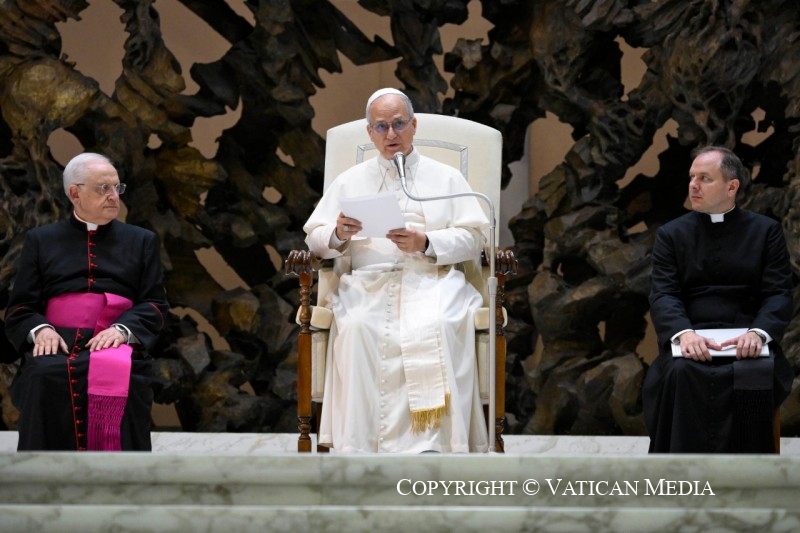Peace in the Holy Land: Pope says no to indiscriminate use of force and forced displacement
At the general audience, Leo makes a new appeal for the release of Israeli hostages, a permanent ceasefire, and the entry of humanitarian aid into Gaza. He expressed his support for yesterday's declaration by the Latin and Greek Orthodox Patriarchs of Jerusalem. In his catechesis to the faithful, commenting on Jesus's attitude at the start of his Passion, he said that “even in the darkest hour, we can remain free to love to the very end.”
Vatican City (AsiaNews) – A few days after Pope Leo XIV called for and held a day of prayer and fasting last week for our brothers and sisters suffering from war, once again, at the end of today's general audience, he made "a strong appeal both to the parties involved and to the international community to put an end to the conflict in the Holy Land, which has caused so much terror, destruction and death.”
In his address, the pontiff said: “I implore that all hostages be released, that a permanent ceasefire be reached, that the safe entry of humanitarian aid be facilitated, and that humanitarian law be fully respected, in particular the obligation to protect civilians and the prohibitions of collective punishment, the indiscriminate use of force, and the forced displacement of populations.”
"I join in the Joint Declaration of the Greek Orthodox and Latin Patriarchs of Jerusalem, who yesterday called for an end to this spiral of violence, an end to the war, and priority for the common good of all people," Leo added, addressing the faithful gathered in the Paul VI Hall. "Let us implore Mary, Queen of Peace, source of consolation and hope: May her intercession obtain reconciliation and peace in that land so dear to all."
The pope's words come as tragic news continue to arrive from the Holy Land, with ever more deaths in the Gaza Strip caused by bombardments and famine.
Despite the latest demonstrations yesterday in Israel, which saw 350,000 people gather in Tel Aviv to demand a ceasefire and the release of Israeli hostages held by Hamas, the Netanyahu government refused to accept the proposed phased agreement negotiated by Qatar and Egypt, which echoes the proposal put forward a few weeks ago by US envoy Steve Witkoff.
Today, the outcome of another summit convened in Washington by the Trump administration, attended by Israeli Foreign Minister Gideon Sa'ar, is awaited. However, an agreement continues to appear distant, and, as the patriarchs in Jerusalem stressed yesterday, the Israeli military operation in Gaza City is “a reality that is already in the process of being implemented.”
The Israeli military today began distributing evacuation notices to new areas, including the area surrounding the Orthodox Church of Saint Porphyrius, the oldest in Gaza, dating back to the 5th century. The area where the Latin Parish of the Holy Family is located remains excluded (for now).
As the patriarchs wrote yesterday, the priests and nuns of the two communities will not obey this order because for many, “fleeing south would be nothing less than a death sentence” and it is necessary to “care for all those who will be in the compounds.”
In his audience, the pope’s latest appeal for the Holy Land came at the end of the weekly catechesis, which, as part of the Jubilee cycle dedicated to "Jesus Christ our Hope," focused today on the story of Jesus who allowed himself to be arrested for his Passion in the Garden of Olives.
"Jesus knows. However, he decides not to retreat. He surrenders," the Pope noted. "Not out of weakness, but out of love. A love so full, so mature, that it does not fear rejection. Jesus is not captured: he lets himself be captured. He is not the victim of an arrest, but the author of a gift. This gesture embodies a hope of salvation for our humanity: knowing that, even in the darkest hour, we can remain free to love to the very end.
“In the heart of the night, when everything seems to be crumbling, Jesus shows that Christian hope is not evasion, but decision. This attitude is the fruit of a profound prayer in which we do not ask God to spare us from suffering, but to have the strength to persevere in love, knowing that life freely offered for love cannot be taken from us by anyone."
The pontiff also cited the passage from the Gospel of Mark about a young man who, when Jesus is arrested, runs away naked (Mark 14:51). “It is an enigmatic but profoundly evocative image," he noted. “We too, in trying to follow Jesus, experience moments in which we are caught off guard and stripped of our certainties.”
In fact, "These are the most difficult moments, when we are tempted to abandon the path of the Gospel because love seems an impossible journey. Yet, it will be a young man himself, at the end of the Gospel, who announces the resurrection to the women, no longer naked, but clothed in a white robe."
"This," Leo XIV said in concluding, "is the hope of our faith: Our sins and our hesitations do not prevent God from forgiving us and restoring our desire to resume our sequela, to enable us to give our lives for others.”







.png)










